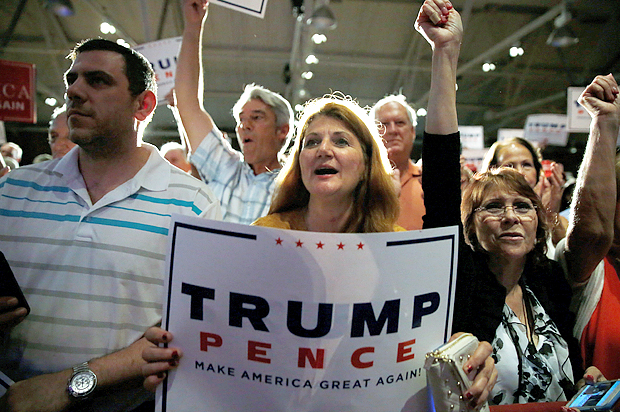Devout followers of President Donald Trump, the man who coined “fake news,” are often the largest promulgators of it.
A study conducted by Oxford University researchers showed that Trump supporters, more than any other group studied combined, shared more “junk” news from sites categorized by researchers as containing “propaganda and ideologically extreme, hyper-partisan and conspiratorial political information.” Using data from nearly 14,000 politically-active Twitter users and 48,000 public Facebook pages, the study sought to examine the most prominent so-called junk sites and find out who has been sharing information the most in the three months leading up to Trump’s State of the Union address, McClatchy reported.
“On Twitter, a network of Trump supporters consumes the largest volume of junk news, and junk news is the largest proportion of news links they share,” the study showed.
Trump supporters shared information from sites such as 100PercentFEDUp, TheAngryAmericans, the website of former U.S. representative Allen B. West, BizPac Review and dozens of others. The compiled list was of all the “junk” sites used for the study, and also contained several left-wing sites as well, such as “Occupy Democrats.”
Sites on the “junk” list also included notable conservative sites, such as Breitbart, The National Review and Sean Hannity’s website.
The study showed that 96 percent of Trump supporters, “among a sample of Twitter users with strong connections to one of 10 groups along the political spectrum,” shared more junk news than any of the other groups did combined. Out of 13 categories on Facebook, 91 percent of “hard conservatives” also shared “junk” information.
While “fake news” shared by all groups came from both the political left and the right, lead researcher Phillip Howard told McClatchy that “most of the junk news that people share over social media ends up with Trump’s fans, the far right. They’re playing with different facts, and they think they have the inside scoop on conspiracies.”
He added, “A small chunk of the population isn’t able to talk politics or share ideas in a sensible way with the rest of the population.”
The study speaks to the escalating polarization of American politics and the ongoing debate over social media sites and what their responsibility is in the sharing and formulating of “fake news” on their platforms. Oxford has often been leading the charge for “fake news” studies and has put forth several reports about how information has been wielded on social platforms.
McClatchy elaborated:
Oxford’s Internet Institute has been at the forefront in studying the impact of the expanding use of social media on politics and democracy in more than two dozen Western countries. The Oxford researchers previously published analyses of the reach of “junk news” during the 2016 U.S. election campaign, especially in Michigan, a presidential swing state, and among military veterans.
Of course, Trump has been the most outspoken about so-called fake news and believes any public information that does damage to him, or his presidency, is fabricated.
His supporters have also been the most vocal critics of mainstream media and information they perceive as deceptive or untruthful. While one can certainly raise questions about vapid mainstream coverage, decrying it as “fake” does more harm in the end than it does provide any good. It’s not surprising that the loudest critics are the ones most susceptible to falling for, and publicly sharing, “junk” and conspiracy theories.

